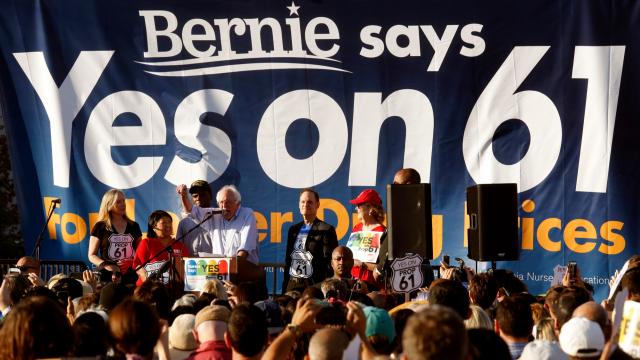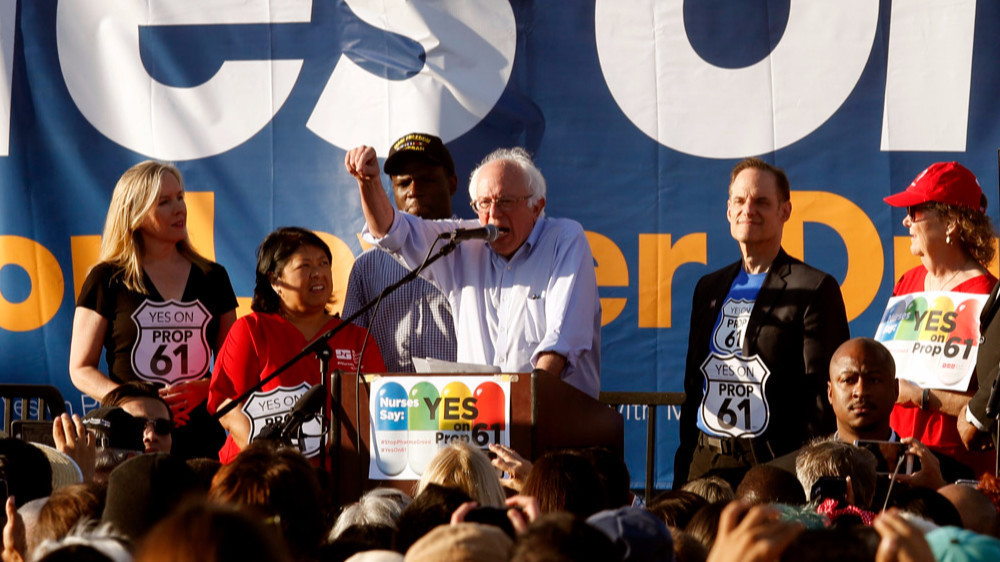
The fight for Prop 61 in California could be a watershed moment in American health care.
Earlier this month, Bernie Sanders held a rally in a parking lot across the street from a Hollywood studio. Hillary Clinton and Donald Trump were not mentioned, nor was any other politician on the 2016 ballot. Sanders was there as part of an effort to lower runaway prescription drug prices. “The pharmaceutical industry has become a major health hazard to the American people!” Sanders thundered in front of about 500 supporters. “This is the most significant proposition in the country today to end pharmaceutical greed.”
Bernie’s crusade is known as Prop 61, and it manages to be both modest and earth-shaking, a minor element in reforming drug-purchasing that would set a critical precedent to stop price-gouging by Big Pharma. If the referendum is passed this November, the majority of Californians will see no relief other than as taxpayers; their drug prices might even rise as an indirect result. But at a time when Americans are deeply concerned about the cost of medicine, any measure with the potential to alleviate the burdens of the current system deserves support.
Written by the AIDS Healthcare Foundation, Prop 61 would require state agencies in California that make prescription drug purchases to only pay what the Department of Veterans Affairs pays. The VA enjoys the lowest prices for drugs in the nation, in part because it is protected by a federal law that prohibits it from paying above 76 percent of the average wholesale price. Polls show significant support for Prop 61, but that’s before gauging the full impact of a drug industry opposition campaign that could total $100 million, making this one of the costliest ballot measures in California history.
If Prop 61 were passed, it would affect a fairly small population. California purchases drugs for current and retired state employees, students at public universities, prison inmates, and low-income beneficiaries of Medi-Cal, the state Medicaid program. However, Medi-Cal managed care plans, which serve 75 percent of all enrollees, are exempt from the rule (probably because the AIDS Healthcare Foundation runs a Medi-Cal managed care program itself). So while California spent $3.8 billion on prescription drugs in the 2014-2015 fiscal year, Prop 61 would cover less than that.
Furthermore, the savings are hard to model. The VA does not publicly disclose how much it pays for medications; it’s assumed that it gets additional discounts beyond the federal ceiling, but nobody knows how much on every drug. State agencies would have to file a Freedom of Information Act request just to know how much to charge the drug companies, and the VA could invoke a trade secret or financial information exemption. Furthermore, the VA has a limited formulary, while Medi-Cal must offer any drug approved by the FDA. On those drugs that the VA doesn’t buy, Prop 61 will have no effect.
Then there’s the fear that drug companies will compensate for their losses by raising drug prices on ordinary Californians or the VA, a prospect that has led most major veterans groups to oppose Prop 61. This response is a bit overblown, given the unknown effect of Prop 61 and the fact that the VA represents only 2 to 3 percent of pharmaceutical sales. But practically every “No on 61” ad has a spokesman in full military uniform—and you don’t discover until the end that the ad is funded by Pfizer and Merck.
But there are a couple reasons Prop 61 has received high-level support from folks like Sanders. First, the measure would set a precedent that governments have the power to lower prescription drug prices. This is already standard in virtually every industrialized nation, but the United States has followed a weird hands-off policy, giving drug companies carte blanche to gouge customers for life-saving medications. The Valeant, Mylan, and Turing Pharmaceuticals scandals this year show what a misguided choice that has been.
We don’t let Medicare negotiate prescription drug prices, and we don’t allow re-importation of drugs from abroad that are often made in the same factories as the ones offered domestically. We deliberately fragment the purchasing pool—splitting them into veterans and civilians, for example—to the detriment of patients. This is a first step to re-integrate that purchasing pool. And as Sanders said, “If we win here in California, other states will be following very, very quickly.” An identical measure is scheduled for the Ohio ballot next year.
In fact, states might not need to make the effort. The nonpartisan Legislative Analyst’s Office points out that federal law allows all state Medicaid programs to receive the same price for prescription drugs as the lowest payer in the U.S. If Prop 61 passes, that lowest price could well be the VA-tied drugs in California. So all Medicaid agencies could request the same deal, lowering prices for tens of millions of poor patients. (Including, ironically, Medi-Cal managed care, which was carved out of this proposition.)
This would likely require defeating industry-initiated legal action. But the result would be chaotic—a chaos we actually need, I would argue. Under the current system, lawmakers are unwilling to do anything but scream about high drug prices. Prop 61 would give them a hammer, one that could be employed to create a fairer system for all Americans.
Congress already has the power to do this; lawmakers did it for the VA, setting a price ceiling and limiting increases to the rate of inflation. The threat of transferring those benefits to virtually all Americans on government-run health care (and it says a lot that we have to call that a threat) could be the needed spur for a larger bargain, whether that includes faster FDA approval, federalization of research and development, changes to the patent laws, or value-based medicine that rewards providers for preventing the need for drugs in the first place. Without such a prod, drug companies will likely use their prodigious political influence to halt progress.
That’s why Sanders likely sees Prop 61 as a worthwhile target for his political revolution. He has used the formidable base of support that he developed during the presidential campaign to target Big Pharma. Billboards across Los Angeles tout his Prop 61 endorsement; he cut a TV ad for the measure as well. The day of the rally, Sanders joked that a single tweet of his about Ariad Pharmaceuticals jacking up the price of a leukemia drug sent the company’s stock into free fall.
Sanders recognizes that, when the status quo leaves Americans exposed, change can only come from the bottom up. In this case, one ballot measure could transform what we pay for drugs in America. “The entire nation is looking at California,” Sanders said. “Let’s go forward together.”
3 WAYS TO SHOW YOUR SUPPORT
- Log in to post comments












